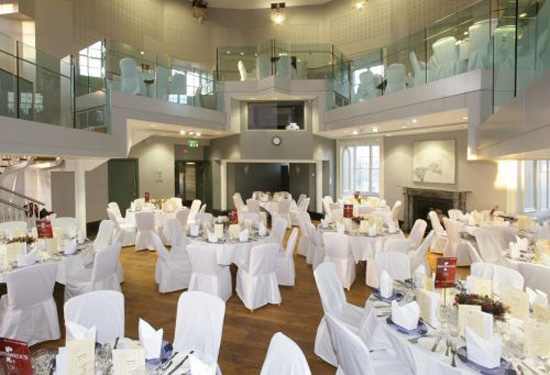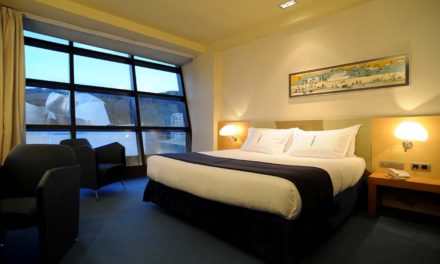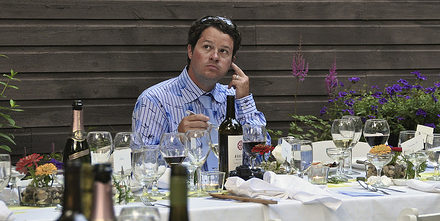
Stacy Ziegler, CPCE, CMP, an active member of the National Association of Catering Executives and director of sales at Bold American Catering, Atlanta. Courtesy image.
Let’s say you’re charged with planning a corporate meeting, casual reception, formal dinner or maybe a wedding. You want to host the event at a venue that doesn’t have its own catering staff. You have the concept and theme in mind, and you even know that you want to have a plated meal, buffet or passed hors d’oeuvres. Before you hire catering or contact catering companies to work the event, it’s helpful to have some initial ideas about the catering menu.
Establish a good balance with your menu, suggests Stacy Ziegler, CPCE, CMP, an active member of the National Association of Catering Executives and director of sales at Bold American Catering, which offers full service catering services to venues throughout Atlanta and organizes more than 500 corporate and social events each year.
“You can go riskier with your passed hors d’oeuvres, side dishes and dessert, but for the main entree you need to remember you are feeding a diverse group of people, Most people like to recognize what they are eating. This doesn’t mean everyone has to serve plain chicken, but be cautious with something very exotic.”
The season of the event also matters. And event planners frequently hold discussions about future events during a completely different season. “Though you may be discussing your menu in the dead of winter, the actual event could be in June. Short ribs and mashed potatoes in January sound fantastic, but when your June event rolls around, you will want something much lighter,” Ziegler says.
So now that you have the catering menu in mind, the next step is to hire a catering company for your event. “Talk to your caterer about what they do best,” Ziegler advises. “They have a lot of experience with crowd favorites, and know what they can execute best.” She offers the following 10 tips for anyone who may be hiring a caterer or catering company for the events:
- Taste catering.
By sampling the caterer’s food, it will give you a chance to taste the catering and view how it will be presented. This is also a great time to meet with the Chef and determine how flexible he or she is. All items can be adjusted to your own tastes, so make sure your feedback is taken seriously. Ask how the food is prepared. Tip:. Ask whether the catering is finished on site, or cooked ahead of time and left in a hot box to stay warm? - Check references of caterers.
Even though you will most likely be given a list of very happy customers, there are still good nuggets of information you can learn if you check references of caterers. It’s an excellent way to gain insights about what the caterer does best. Good questions include: How many times they have used the caterer? What did you like best about their catering services for events? What is one thing you would change for their next event? - Review past catering pictures.
Catering pictures will give you a sense of how their events are set up. Do you like their service ware, use of spacing, and finishing touches? Is it the style you would like for your event? It is also a great way to explain to the caterer what you like by pointing to things in the pictures that you would like to see repeated at your event. - Determine your level of involvement.
Some caterers are full service and provide linens, tables, chairs, florals and décor. You can give them an idea of what you like and they can pull everything together for you and organize all the vendors. Some caterer’s only provide food and service, and you will be responsible for coordinating all your other items and vendors. Either way is fine, as long as it matches your needs. - Review catering menu and proposal in person.
This gives you a chance to see the catering operation. Is the office clean? Are you greeted in a timely manner? If you have any hesitation during this process, it will probably carry over to the event day. - Catering sales process should demonstrate organization.
If your proposal is timely and your sales manager is flexible, that is probably a sign of the company culture. Those traits will most likely carry over into the team that handles your event. The opposite could also be true. If your proposal is sent to you after the date promised, it may be a sign that timeliness isn’t an important value for the caterer. - Ask about the fine print.
Is your proposal all inclusive of everything you asked for? Is tax included, will the price vary per person if your guest count goes up or down. How does the service charge or labor work? Will you be responsible for tipping the staff that evening? When you compare proposals from one caterer to another, it is important you are comparing apples to apples and understand all your costs for the event. - Choose a caterer familiar and approved for your venue.
Many venues have a preferred caterers list. If you use someone on that list, they will be familiar with the rules and may have fewer mishaps on the day of your event. They may also have other privileges that they can pass on to you. Caterers who are not familiar with a venue may be cheaper at first glance, but you may have post event charges from your venue because the caterer didn’t remove the trash as required or some other penalty for not understanding the venue policies. - Ask about food and beverage special requirements.
Ask your caterer how they handle dietary restrictions, on site changes and late additions. Even the best planners are usually faced with an on-site surprise. Will your caterer be able to pull together a gluten free meal? If the welcome speech goes 15 minutes late, will the kitchen be able to roll with a new time line? Flexibility and a can-do attitude are crucial during events. - Know who is in charge on day of event.
Most times the person you are planning with will not be the primary contact the day of the event. If you want to make changes or have questions that day, it is important to know your contact. Depth in the team will give you some assurance that if one person is missing during your event because of sickness or a conflict, there is still a whole team behind them.
“Different caterers specialize in different things, so you may want to hire one caterer for your corporate picnic and another for your formal holiday party,” Ziegler adds.















